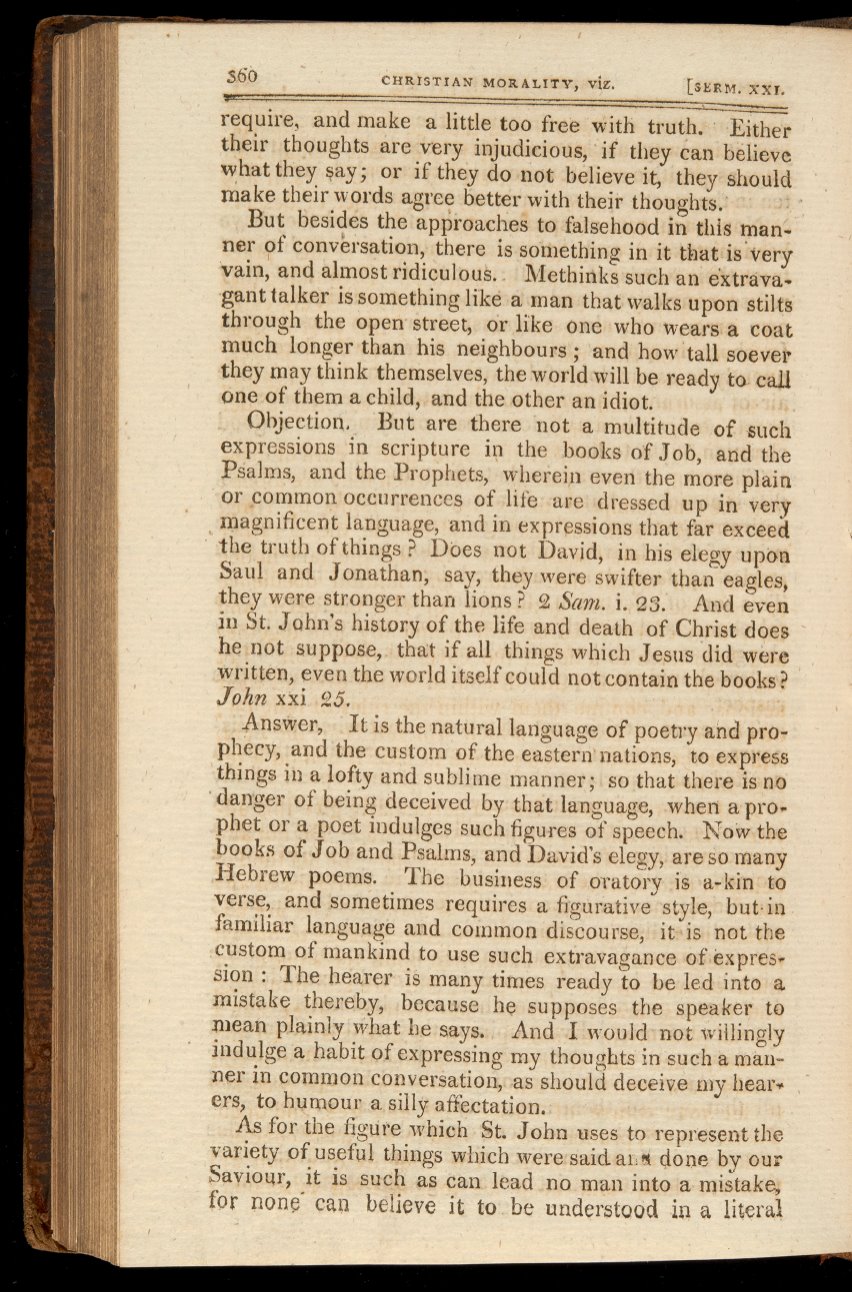

StO
CHRISTIAN MORALITY,
Viz.
[S1;RM.
xxi.
require, and
make
a
little
too free with
truth. Either
their
thoughts are very
injudicious,
if
they can believe
what
they
say; or
if
they do
not
believe
it,
they should
make
their
words agree
better
with
their thoughts.
But
besides the
approaches
to
falsehood
in
this man-
ner of
conversation, there
is
something
in
it that
is
very
vain, and
almost ridiculous. Methinks such an
extrava-
gant
talker
is
something
like a man
that
walks
upon
stilts
through
the
open
street, or like one
who
wears
a
coat
much
longer than
his
neighbours
;
and
how
tall
soever
they
may
think
themselves,
the world
will be
ready
to
call
one
of
them a child, and the
other
an idiot.
Objection.
But are there
not
a multitude
of
such
expressions in
scripture
in
the books
of Job,
and
the
Psalms,
and
the
Prophets,
wherein
even the more
plain
or
common
occurrences
of
life
are
dressed up in very
magnificent language,
and
in
expressions
that
far exceed
the
truth of
things
?
Does
not
David, in
his elegy
upon
Saul
and
Jonathan,
say,
they were swifter
than
eagles,
they
were
stronger than
lions
?
2
Sam.
i.
23.
And even
in
St.
John's
history
of
the
life
and
death
of
Christ
does
he
not
suppose,
that if
all things which
Jesus
did were
written, even the
world
itself
could
not contain
the books?
John
xxi 25.
Answer,
It
is
the
natural
language
of
poetry
and
pro-
phecy,
and
the custom
of
the
eastern
nations,
to
express
things
in a
lofty
and
sublime
manner;
so
that
there
is
no
danger
of
being deceived
by
that
language, when a
pro-
phet
or a poet indulges
such figures
of
speech.
Now the
books
of Job
and
Psalms,
and David's
elegy,
are
so
many
Hebrew
poems.
The
business
of oratory
is
a
-kin
to
verse,
and sometimes requires a figurative
style,
but
in
familiar language and
common discourse,
it
is
not
the
custom
of
mankind
to use
such
extravagance of'expres-
sion
:
The hearer
is
many times
ready
to
be
led into
a
mistake thereby, because
he
supposes the speaker
to
mean
plainly what
he
says.
And
I
would
not
willingly
indulge a
habit
of
expressing
my
thoughts
in
such a man-
ner
in
common conversation,
as
should deceive
my hear,.
ers,
to
humour a
silly
affectation.
As
for the figure which
St.
John
uses to
represent
the
variety
of
useful things
which
were
said
ai,*t
done
by
our
Saviour,
it
is
such
as
can lead
no
man into
a
mistake,
for
none"
can believe
it
to be
understood
in
a literal

















